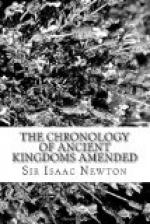A SHORT
CHRONICLE
FROM THE
First Memory of Things in Europe,
TO THE
Conquest of Persia by Alexander the
Great.
* * * * *
The INTRODUCTION.
The Greek Antiquities are full of Poetical Fictions, because the Greeks wrote nothing in Prose, before the Conquest of Asia by Cyrus the Persian. Then Pherecydes Scyrius and Cadmus Milesius introduced the writing in Prose. Pherecydes Atheniensis, about the end of the Reign of Darius Hystaspis, wrote of Antiquities, and digested his work by Genealogies, and was reckoned one of the best Genealogers. Epimenides the Historian proceeded also by Genealogies; and Hellanicus, who was twelve years older than Herodotus, digested his History by the Ages or Successions of the Priestesses of Juno Argiva. Others digested theirs by the Kings of the Lacedaemonians, or Archons of Athens. Hippias the Elean, about thirty years before the fall of the Persian Empire, published a breviary or list of the Olympic Victors; and about ten years before the fall thereof, Ephorus the disciple of Isocrates formed a Chronological History of Greece, beginning with the return of the Heraclides into Peloponnesus, and ending with the siege of Perinthus, in the twentieth year of Philip the father of Alexander the great: But he digested things by Generations, and the reckoning by Olympiads was not yet in use, nor doth it appear that the Reigns of Kings were yet set down by numbers of years. The Arundelian marbles were composed sixty years after the death of Alexander the great (An. 4. Olymp. 128.) and yet mention not the Olympiads: But in the next Olympiad, Timaeus Siculus published an history in several books down to his own times, according to the Olympiads, comparing the Ephori, the Kings of Sparta, the Archons of Athens, and the Priestesses of Argos, with the Olympic Victors, so as to make the Olympiads, and the Genealogies and Successions of Kings, Archons, and Priestesses, and poetical histories suit with one another, according to the best of his judgment. And where he left off, Polybius began and carried on the history.
So then a little after the death of Alexander the great, they began to set down the Generations, Reigns and Successions, in numbers of years, and by putting Reigns and Successions equipollent to Generations, and three Generations to an hundred or an hundred and twenty years (as appears by their Chronology) they have made the Antiquities of Greece three or four hundred years older than the truth. And this was the original of the Technical Chronology of the Greeks. Eratosthenes wrote about an hundred years after the death of Alexander the great: He was followed by Apollodorus, and these two have been followed ever since by Chronologers.




